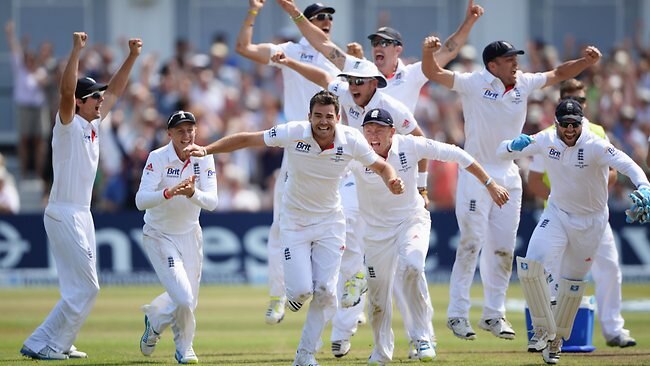Brad Haddin repays selectors in second act
YOU wouldn’t want to play poker with Stuart Broad; but you might with Brad Haddin.
YOU wouldnÂ’t want to play poker with Stuart Broad; but you might with Brad Haddin.
On Friday afternoon, Broad, indifferent and inscrutable, stood his ground after a nick to Haddin that almost left a gash in the ball. At 2.25pm yesterday, however, Haddin imparted his own, far subtler, edge to a delivery from James Anderson, and immediately imparted the sense the jig was up.
As the appeal reverberated, he gave the umpire a quick glance. As it was rejected, he looked down, and away.
When he walked up to his partner in their stirring last-wicket partnership, James Pattinson, he did not flash him the laconic smiles he had allowed himself from time to time during the day. And Broad’s insouciance notwithstanding, the body language of a batsman who knows he’s in trouble still possesses powerful qualities as a ‘tell’ [dash] so powerful that the ICC might conceivably experiment with a kind of ‘Guilt-o-Meter’ in adjudication. It would be at least as reliable as Hot Spot.
Cricketers seldom get exactly what they deserve, but Haddin certainly deserves better than to be remembered as the man who lost this Test match for Australia when he had gone so close to being the one who won it. While there are allegedly no second acts in American lives, he has proven that there are second opportunities for Australian cricketers.
Fourteen months ago, Haddin seemed to be slipping into a twilight when he returned for personal reasons from a tour of West Indies, leaving the gloves in custody of a lively apprentice, Matthew Wade. Haddin to Wade looked a natural line of succession, an opportunity for the old timer to accept the thanks of a grateful nation for services rendered, and give way in time-honoured fashion to the younger man. He had done his duty. He had business at home. Time for a change.
But in any other terms than sport, Haddin was a young man, just thirty-four, and he begged to differ. He returned to domestic cricket, led well, made runs, kept tidily. Eight months ago, I saw him make a quicksilver leg-side stumping in a Sheffield Shield match while standing up to the sprightly seam bowling of Trent Copeland. The skills were still there, if and when needed.
It turned out that even more than skills, what Australia needed was knowhow. Haddin has been the upside of the retirements of Ricky Ponting and Mike Hussey, for he has taken the gloves back from Wade in order to provide the kind of gum-chewing, green-and-gold implacability this team is perceived to lack.
Interestingly, on the eve of this Test, Shane Watson divulged in a ghosted column that Haddin suffers acutely from nerves, to the extent he finds it difficult to eat during games. They must be the kind of nerves alleviated by the crossing of a boundary rope, because he seldom exudes anything other than on the field than laconic self-control and enterprise.
It became obvious as the last day unfolded why last summer Steve Waugh advanced the counterintuitive notion that Haddin might play as Australia for a batsman. He looked here as good as ever: an impermeable bastion in defence and sweet timing in attack, with a timely reappearance of his signature drive down the ground in the air.
As Sunday dawned, we were almost back to where we began on Wednesday, the weather overcast, the sky dim, the floodlights on, the ground quiet and still after the morning rendition of ‘Jerusalem’, which is becoming to Test cricket what ‘Bohemian Rhapsody’ is to karaoke [dash] the originally cheering notion rendered utterly stale by repetition.
Alastair Cook opened with Anderson and Swann, his best bowlers [dash] which represents a problem for him, because it is something somehow everyone knows, and the pressure is subtly relieved when anyone else is turned to.
So it proved. Anderson bowled superbly. His transformation from a classically English swing bowler to the best paceman in the world in dry conditions is entirely breathtaking. He is now as classically English as chicken tikka marsala.
But when Anderson gave way at last after his leonine thirteen-over spell, Haddin pounced the pedestrian and diffident Finn. When Haddin faced the next over from Swann, it was with five fielders on the fence. Suddenly it was Cook who looked beleaguered, almost benighted.
Haddin had willing helpmates. The task was far tougher for the student prince Ashton Agar than what had been required on the first couple of days. Playing with no fear and complete freedom, apparently his creed, comes far harder when there is such an abundance of trepidation about. Half the overs in the first hour were maidens, with little room for his glorious free swing of the bat.
In Swann’s second over, Agar danced down the wicket, miscued a flail to Broad at mid-on, dithered over a single for a misfield, and all of a sudden in mid-pitch looked gangling, boyish and incongruous amid such tense exchanges.
In Broad’s first over, Agar surveilled a fielder being ostentatiously adjusted at deep backward square leg, was gulled into expecting a shorter one and wafted at the delivery pushed across him [dash] and double bluff seems almost unfair when perpetrated at the expense of a nineteen year old.
In Broad’s second over, Agar wound up gloriously, bat around his ears, and flogged the ball forward of point for four, bringing salaams from the wattle outcrop of Fanatics in the new stand but only a subdued ripple of applause from elsewhere [dash] a vestige of his form, if not his effect, on Thursday.
Everyone then had been cheering for him; spectator allegiance now had a more obviously partisan aspect. The roar that erupted when Agar nicked Anderson to slip was itself a kind of tribute, the eager prodigy having been transformed over five days into a worthy opponent.
But it was the spirit of Agar from that second day which perhaps encouraged the idea that everything remained possible. After all, if a teenager can almost score a hundred on debut at number 11, then almost no possibly is precluded: recall for Mark Ramprakash, a spin bowling coaching appointment for John Howard or a game for the ashes of Margaret Thatcher seem almost probable by comparison.
In James Pattinson, Haddin found a final splendid consort, a competent technician and an arch competitor, who could easily pass for a specialist batsman at a slightly lower level of the game, because he was one until a growth spurt aged fourteen encouraged him to take up bowling. And, astoundingly, almost 40 per cent of Australia's runs in this game were added by the respective last wicket partnerships. If there ever was a record for this, this game was made to measure.
Haddin knew Pattinson well enough to indulge him with strike, Swann well enough not to toss the ball up to him again after being wellied down the ground for six. When lunch came, Australian appetites were heartier than English. But there would be no second act in Australia’s day, and it barely needed video assistance to confirm it. One look at Haddin’s face was enough.



